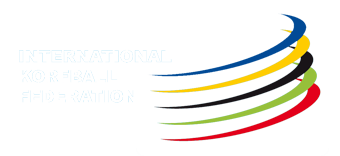President’s blog: 40 minute matches
(by Jan Fransoo – IKF President) This week at the IKF European Korfball Championship in the Netherlands and earlier this year at the IKF U23 World Korfball Championship in the Czech Republic we have been playing in a new match format: 40 minutes matches in two halves of 20 minutes, with each half split into two quarters of 10 minutes with a 45 second break in between. Over the course of the week, I have received many questions from different angles and also an interesting discussion on Facebook has been taking place. It is good to provide some background on what we are doing and why we are doing this. Below, I will try to answer some of the most common questions asked.
What is the formal status?
The formal status of this new playing time of 40 minutes is still an experiment. We have decided to do this at the U23 WKC, the EKC and next year at The World Games. We are continually evaluating this and I expect we will make a formal decision some time next year.
Why did we reduce the match length by 10 minutes?
There is actually a variety of reasons. The first reason is the protection of the athletes. Since in our tournament a lot of matches are played in a short period of time, and only a few rest days can be fit into a week’s tournament, the length of the matches actually has a significant impact on the athletes’ performance and their injuries. Medical advise tells us the number of injuries should go down and played should be less tired at the end of the week when the most important matches are played.
The second set of reasons relate to the spectator experience, both at the venue and remote (online or TV). Shorter matches avoid that sometimes a game tends to drag along, or strength differences between teams are very large. It is better to have a spectator fully engaged for the 40 minutes of a match, rather than have them engaged for 40 minutes out of a 50 minute match. We definitely need to further develop this, as we need to take better advantage of this new playing length by programming the matches shorter after one another, but definitely the shorter playing length does provide us with new opportunities.
Why are we playing in quarters rather than halves?
The main reason for this is the spectator experience, both at the venue and remotely. We have many great actions in the matches, but our game is so fast that there is barely time for replays and slow motions. Professional TV directors that have conducted live coverage of korfball matches have complained to us about this. Our great webcasting team has been able to show this week what can be done, with replays of great match action during the 45 second break. This can however be very well extended and we are welcome to have ideas on this. Within the venue, I think we definitely can do more to actively engage the audience during breaks, as especially the non-korfball audience expects more in terms of engagement. Some good examples were practised in Cali at The World Games and also some novelties were introduced in Olomouc. A better transfer of these practices to new organizers is needed and standards need to be formulated.
An interesting side effect of shorter period is that the average number of goals per minute tends to go up, so the intensity of the spectator experience is larger.
Will this have any effect for the length of play and number of periods in your national league?
That is up to your national organization. Once we have concluded the experimental phase, the IKF will make a decision for the international competitions. The length of play and number of period is a competency that resides with each national korfball association to decide on. Currently, there are already large differences, mainly determined by the fact whether a national league is running in a tournament format or in weekly or biweekly matches.
What if you have questions or suggestions?
In principle, your national korfball association is our point of contact, so they would need to be the first to get in touch with. However, the IKF is always open to receive ideas or suggestions, so that the IKF playing rules committee and the IKF competitions committee can take these ideas along. You can contact us by email at office@ikf.org. Furthermore, if you are a player in a national team, also be aware that the IKF Athletes Committee is there to voice the opinion of the athletes. You can contact them with any of your concerns or ideas. The members are Suzanne Struik (NED – chair), Ricky Wu (TPE), Isabel Almeida (POR) and Nikki Schilders (BEL).
I hope this helps you to better understand our deliberations on this topic.
Jan Fransoo
IKF President



